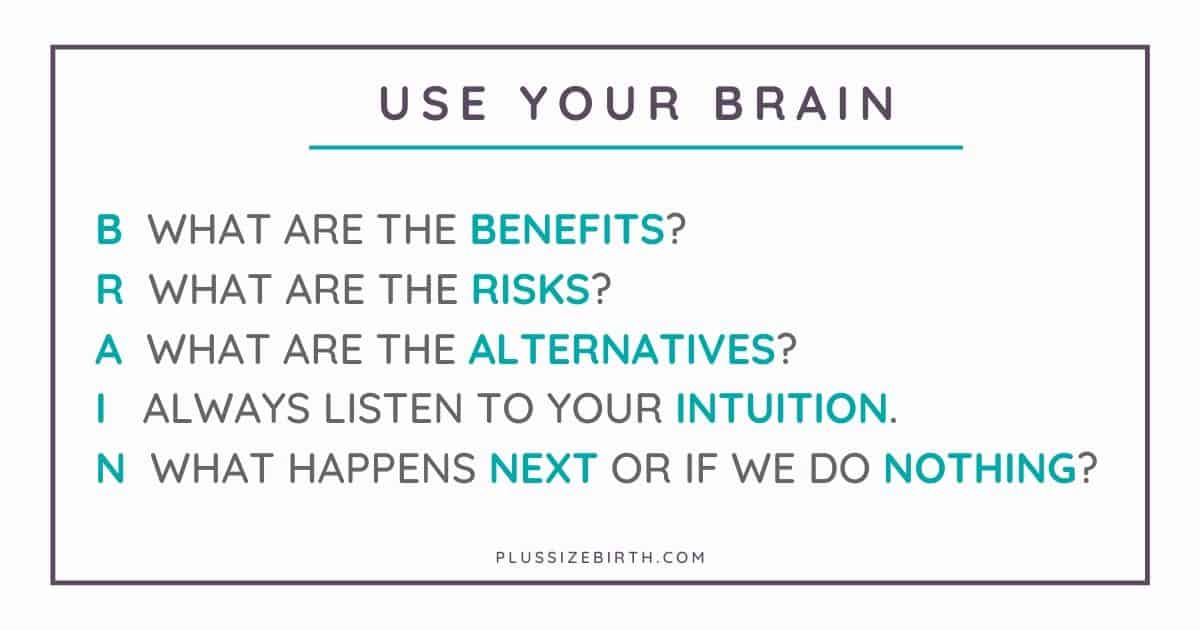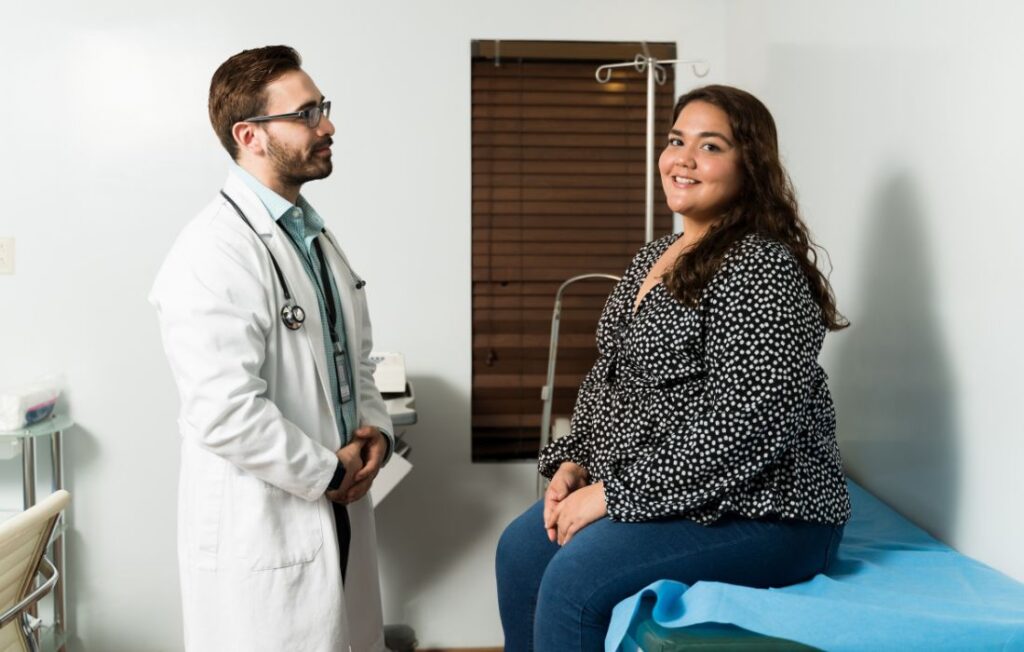We wish you never needed to wonder, will my doctor fat-shame me? But, unfortunately, it's a valid concern, especially when patient/doctor power dynamics are at play.
So, let's talk about expecting the best during doctor appointments but learning to advocate for yourself if needed!
When you’re pregnant, prenatal visits can be an exciting time to hear your baby’s heartbeat and celebrate new milestones. Unfortunately, these appointments can also be a time of worry when you might experience size bias from the medical community.
Typically, bringing a support person to doctor appointments can help things go smoothly on all fronts. And this is the case for all doctor visits, not just prenatal appointments.
But what if you can’t bring someone with you?
Or what if you don’t want to bring someone with you to your doctor’s appointment?
We’ve got you covered!
How To Prepare For Doctor Appointments When Fearful Of Fat-Shaming
Before you even have your appointment scheduled, you want to do all you can to ensure you’re under the care of a size-friendly healthcare provider.
Connecting with a fat-friendly doctor means that you’re working with someone who practices evidence-based compassionate care.
You are viewed as a whole person, not just a number on the scale!
Size-friendly care providers exist, and it’s worth the time it takes to connect with someone who will treat you with dignity.
With that said, it’s not uncommon for people to see different providers within one practice throughout prenatal care.
Sierra Holmes of Eclectic Kurves shares her experience.
“When I was pregnant with my first child, my OB office had rotating doctors in the practice. That meant I had to see eight doctors just in case my primary doctor wasn't on-call the day I went into labor. One of the doctors in the practice told me on my first visit that I should stop eating pizza on Friday nights and lay off the sugar. I didn't even really eat pizza. He was out of line, but he was comfortable there. So many women have expressed similar stories of being judged because of our weight when seeking proper healthcare. It's absurd.
We all deserve to trust our healthcare professionals and feel supported by them. I'm lucky enough now to have found that and I know the difference in support and judgment. Many of us suffer in silence…never truly getting a glimpse of a better experience.”
Further complicating the search for a size-friendly provider is availability and access. Some people are limited to the list of providers they can select based on insurance and cost.
Let’s dig into helpful steps when going to doctor appointments alone when you’re fearfully questioning, will my doctor fat-shame me?

1. Plan Ahead For Doctor Visits
Odds are you’re reading this article because you already know what it’s like to be fat-shamed by a care provider (and I’m sure sorry if that’s the case).
Or maybe you’ve heard one too many upsetting stories.
Either way, one essential thing you can do to prepare for doctor visits and navigate daily life is to learn how to set healthy boundaries.
Set Healthy Boundaries
When you set boundaries, you feel empowered.
For example, getting on the scale can be a triggering experience for some people.
So, before you even arrive, you decide what you’re comfortable with regarding the scale.
During prenatal visits, being weighed is beneficial, so your provider can address any medical concerns if rapid weight loss or weight gain occurs. With that said, you still have options and can set boundaries.
You can request that your weight isn’t said out loud. Some people prefer to stand on the scale backward, so they can’t see the number. Others weigh themselves in their own home and give the number to their care provider.
That last tip, or even refusing to be weighed, can be met with pushback from your provider. It’s good to listen to why they recommend being weighed in their office should that come up.
Ultimately, you can decide what you are or aren’t comfortable doing during care provider visits.
Sometimes just knowing that you have options and the right to say NO can be a relief.
Learning how to set healthy boundaries in advance is a big part of planning ahead.
Reduce Stress Before Arriving At Your Appointment
You can also prepare by adding time to your schedule to arrive a little early. This can help to reduce the stress that often occurs when you’re running late.
Consider bringing something with you, like a stress ball or essential oils, that helps you to relax.
Music can also be a welcome distraction in the waiting room or during a medical procedure. If you’d like, bring earbuds and listen to music that lifts your spirits, or tune in to an episode of the Plus Mommy Podcast.
Please know if you really want someone with you but they can't come in person, you still have options. You can bring a support person via video on your phone. Plan to have that person on standby for your call. Maybe you won’t feel the need to call them, but they could be there for you just in case.
For even more tips about anxiety when pregnant, read our article How To Reduce Anxiety During Pregnancy – 7 Helpful Tips.
2. Write Down Questions In Advance
You might have a fantastic memory most of the time, but when you’re in a vulnerable situation, it’s easy to forget the important things to ask.
Write down any questions and concerns you have in advance! Also, write down any labs or medications you want to inquire about.
Take a notebook with you or use your notes app on your phone – whatever works!
Along with getting all of your concerns addressed, there are a few more questions and “notes to self” you might want to jot down.
If you need to make a major medical decision, or something isn’t sitting quite right, have the BRAIN acronym handy. By asking these questions, you can decide how you want to proceed.

BRAIN Acronym
B – What are the benefits?
R – What are the risks?
A – What are the alternatives?
I – Always listen to your intuition!
N – What happens next or if we do nothing?
Lastly, if you feel like you’re only being treated like a number on a scale and not your whole health picture, there’s an important question you should consider.
Ask your provider if they would make the same medical recommendation for a thin patient. By asking this, you’re reframing the conversation to ensure your medical concerns are addressed without focusing only on your weight.
3. Advocate For Yourself During Your Doctor's Appointment
You’ve done all you can to prepare, and it’s time for your appointment.
Remember that most providers have your best interest at heart! So, go into that visit feeling like everything should go smoothly.
As you’re called back for the routine measurements, don’t forget those boundaries you’ve set in advance.
Be sure to pay close attention and ask that the correct size blood pressure cuff be used to get an accurate reading. If you need to undress, are you provided with a gown that fits? And are there inclusive seating options available throughout the lobby and exam room?
When you’re meeting with your provider, if anything is said that makes you uncomfortable, pull out those questions to make sure your concerns are being addressed.
If you're in a situation where you are with a care provider who is fat-phobic, and you're unable to switch medical facilities, ask if there's another provider in the practice you can see.
You can also set boundaries with a care provider focused on your size, not your overall wellness. For example, if they continue to bring up your weight or something that makes you uncomfortable, ask for it to be noted in your chart that you've already discussed “XYZ.” Then, say that you'd like to move on with your appointment, and ask them to refer to their notes if they bring things up during future visits.
Speak Up
But, if something upsetting is said to you, you have every right to speak up immediately.
If that’s uncomfortable, you can say something after you’ve gotten home via a phone call to their office, an e-mail, or filing a formal complaint.
Your voice matters, and you can leave reviews (both positive and negative) for care providers online and via their social media outlets.
By sharing your experience, you can help other plus size parents-to-be to connect with fat-friendly care providers (and avoid professionals who are not size-friendly!).

4. Decompress Afterwards
Following an experience that can be stressful to walk through on your own. Even if you were treated with kindness, it could be helpful to talk to someone.
Many people have a partner or close friend to confide in, and that’s wonderful.
Have that special someone on-call for you, so they’ll expect a phone call following your appointment.
If you don’t have a go-to person or need additional support, connecting with a therapist during pregnancy is helpful.
We often only hear about people needing therapeutic support during the postpartum period. The truth is symptoms of depression and anxiety during pregnancy are not uncommon.
You’re not alone if you’re struggling!
Dr. Kat, a Perinatal Mental Health Certified Psychologist, of the Mom & Mind Podcast, talks about getting support during pregnancy.
“We, as specialists in perinatal mental health, prefer to start supporting people during pregnancy when possible. In part, because many times, depression and anxiety start in pregnancy…it's not just postpartum. Also because it's best to have a game plan for postpartum before it has a chance to get bad or worse. Being proactive, getting the supports you need in place during pregnancy reduces stress during pregnancy as well as in the postpartum period.”
Postpartum.net is an outstanding resource for your mental health concerns throughout pregnancy and postpartum.
Self-Care is Essential!
Before we wrap up, there’s one more thing you need to do.
You’ve had your appointment. You advocated for yourself when needed, and talked to someone supportive afterward.
And now it’s time to do something nice for yourself!
Self-care can be as simple as taking some time for yourself to read a book or go for a walk.
Whatever it is that helps you to relax and feel good in your body, do that thing!
We hope these tips were helpful!
Download our My Size-Friendly Care Providers Guide, today for even more supportive tips.
- Gestational Diabetes Diagnosis: What Now? A Helpful To-Do List! - October 18, 2023
- Navigating Miscarriage and Self-Blame as a Plus-Size Individual - October 16, 2023
- How much does your BMI increase the odds of shoulder dystocia? - August 11, 2023





